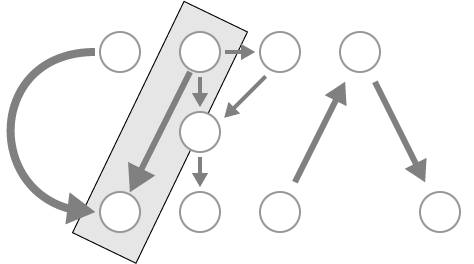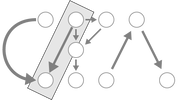The concept of an agent as an individualized entity that can act and has goals is an abstraction from living organisms that also includes robots and virtual creatures. It is therefore a suitable concept to study at the intersection of neuroscience, biology, and artificial intelligence.
Researchers have used information theoretic concepts for:
The CIPA workshop has a two-day program, curated by the research group at Araya Inc. (www.araya.org), funded by the Japan Science and Technology Agency (JST). The goal of this workshop is to bring together information theorists and neuroscientists to discuss the relations between information-theoretic concepts and the foundations of agency.
Topics in the foundations of agency include:
Information-theoretic concepts include:
Researchers have used information theoretic concepts for:
- Quantitative classification of a given agent-environment interaction as seen from the outside of the whole agent-environment system. Examples are the information theoretic notions like (non-trivial) informational closure, autonomy, morphological computation, relevant information, the thermodynamics of prediction (useless nostalgia), stochastic thermodynamics with feedback, semantic information.
- Quantitative measures that can be used by Bayesian or reinforcement learning agents internally to guide their behaviour. Examples are the intrinsic motivations of information gain (also known as knowledge-seeking or the free energy principle), empowerment, predictive information maximization.
- Quantitative classification of the dynamics of the physical components of an agent. The only example here is IIT which detects consciousness including conscious concepts.
- Quantitative detection of entities constituting agents within a given dynamical system. Examples are informational individuality, complete local integration.
The CIPA workshop has a two-day program, curated by the research group at Araya Inc. (www.araya.org), funded by the Japan Science and Technology Agency (JST). The goal of this workshop is to bring together information theorists and neuroscientists to discuss the relations between information-theoretic concepts and the foundations of agency.
Topics in the foundations of agency include:
- Individuality and boundaries
- Goal-directedness
- Action and perception
Information-theoretic concepts include:
- Emergence
- Intrinsic motivations
- Thermodynamics
- Bayesian / Free Energy agents
- Transfer entropy
- Non-trivial information closure
- Integrated Information Theory (IIT)
Confirmed Speakers
Larissa Albantakis - University of Wisconsin-Madison, US
Shunichi Amari - RIKEN Center for Brain Science
Martin Biehl - Araya Inc., Japan
Takuya Isomura - RIKEN Center for Brain Science, Japan
Sosuke Ito - The University of Tokyo, Japan
Pedro Mediano - Imperial College London, UK
Fernando Rosas - Imperial College London, UK
Christoph Salge - University of Hertfordshire, UK
Hideaki Shimazaki - Kyoto University
Susanne Still - University of Hawaii, US
Masatoshi Yoshida - National Institute for Physiological Sciences / Hokkaido University, Japan
Shunichi Amari - RIKEN Center for Brain Science
Martin Biehl - Araya Inc., Japan
Takuya Isomura - RIKEN Center for Brain Science, Japan
Sosuke Ito - The University of Tokyo, Japan
Pedro Mediano - Imperial College London, UK
Fernando Rosas - Imperial College London, UK
Christoph Salge - University of Hertfordshire, UK
Hideaki Shimazaki - Kyoto University
Susanne Still - University of Hawaii, US
Masatoshi Yoshida - National Institute for Physiological Sciences / Hokkaido University, Japan
Local Organisers:
Ryota Kanai (Araya Inc.)
Masafumi Oizumi (The University of Tokyo)
Acer Chang (Araya Inc.)
Martin Biehl (Araya Inc.)
Yen Yu (Araya Inc.)
Hiroaki Hamada (Araya Inc.)
Masaru Kuwabara (Araya Inc.)
Ippei Fujisawa (Araya Inc.)
Ryota Kanai (Araya Inc.)
Masafumi Oizumi (The University of Tokyo)
Acer Chang (Araya Inc.)
Martin Biehl (Araya Inc.)
Yen Yu (Araya Inc.)
Hiroaki Hamada (Araya Inc.)
Masaru Kuwabara (Araya Inc.)
Ippei Fujisawa (Araya Inc.)


